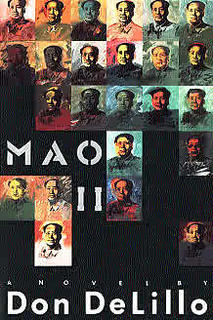 Don't you really want to read this book, sure you do?
Don't you really want to read this book, sure you do? Bill Gray in Mao II says:
"Do you know why I believe in the novel? It's a democratic shout. Anybody can write a great novel, one great novel, almost any amateur off the street. I believe this, George. Some nameless drudge, some desperado with barely a nurtured dream can sit down and find his voice and luck out and do it. Something so angelic it makes your jaw hang open. The spray of talent, the spray of ideas. One thing unlike another, one voice unlike the next. Ambiguities, contradictions, whispers, hints. And this is what you want to destroy."
If you read Franzen's The Corrections you need to read DeLillo's Underworld and then perhaps MaoII.
DeLillo, interestingly, when talking about writers says,
"I write to find out how much I know. The act of writing for me is a concentrated form of thought.",
and
"Writing is a form of personal freedom. It frees us from the mass identity we see in the making all around us. In the end, writers will write not to be outlaw heroes of some underculture but mainly to save themselves, to survive as individuals."
DeLillo's books are widely available.

4 comments:
I'm not too sure what Dingo means, but then again perhaps I am.
For more of Dingo's work see
Shapelle Corby.
I have never understood how readers see a likeness between Don De Lillo and Jonathan Franzen. Whatever their subject matter, they handle language in utterly different ways. De Lillo writes in a considered vernacular that is altogether different from (and lesser than) Franzen's magisterial command of everything the language can do. De Lillo is also anchored to a "guy" point of view, while Franzen enters easily into female states of mind.
Franzen is without a doubt the master of the voice. He can be whatever he chooses, male, female, gay, straight, but more importantly unique. The characters in The Corrections though they have some stereotypical features, like anyone else, are unique and complex with some real depth. DeLillo, as you say, is simply a guy and wrties like one. The connections between DeLillo are twofold: they know each other and correspond as reported by the biographers, and they both write in a way that brings many different threads together which by the end of the work forms a whole cloth that is not obvious at the begining. And, I believe that this premise, this idea of connections, came from an article in the Guardian, I'll try to find it.
Bingo, searching on "connections corrections franzen guardian" the article is the first hit, to wit:
What the Dickens, James Wood assesses the importance of Jonathan Franzen's new book, The Corrections, a Bleak House of the digital age, Friday November 9, 2001, The Guardian.
And, don't miss Franzen himself in 2001:
In 1996, Jonathan Franzen made a reckless public vow. He did it in the pages of the American magazine Harper's, in a bitter, eloquent, intensely personal essay entitled 'Perchance to Dream: In an Age of Images, a Reason to Write Novels'. The big socially engaged novel was dead, he declared, killed off by TV.
Serious postmodern novelists like Thomas Pynchon and Don DeLillo were doomed to irrelevance. Contemporary readers wanted entertainment, not news, engaging stories, not ideology. Franzen did more than just diagnose the problem. He implied that he could solve it. He made a promise to deliver a book that had it all, a novel that was intimate, socially engaged and compelling.
From Emily Eakin, Sunday November 11, 2001, The Observer.
Post a Comment